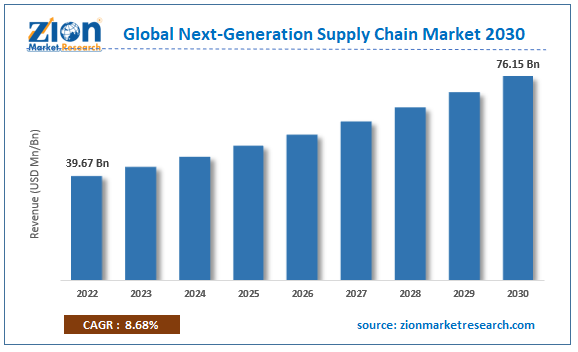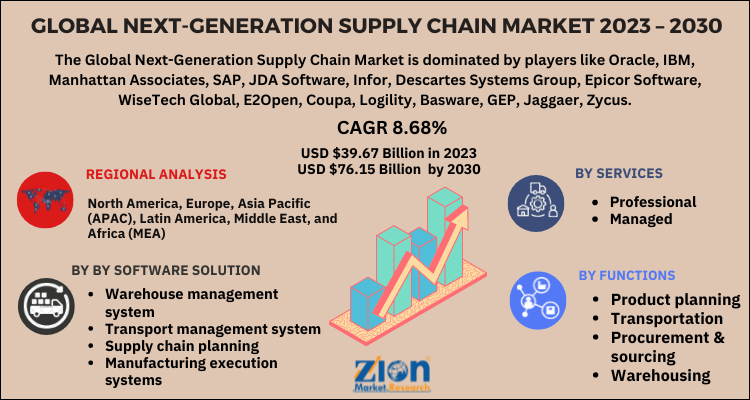Next-Generation Supply Chain Market Size, Share, Trends, Growth and Forecast 2030

Next-Generation Supply Chain Market By Functions(product planning, transportation, procurement & sourcing, and warehousing), By Software solution (warehouse management system, transport management system, supply chain planning, manufacturing execution systems, and manufacturing resource planning) By Technology(IoT, AI, blockchain, robotics & automation, augmented reality, cloud computing, digital twin, cyber security, drones & driverless vehicles, 3D printing, mobile devices, and wearable) By Services(professional and managed) And By Region - Global And Regional Industry Overview, Market Intelligence, Comprehensive Analysis, Historical Data, And Forecasts 2023 - 2030-
| Market Size in 2022 | Market Forecast in 2030 | CAGR (in %) | Base Year |
|---|---|---|---|
| USD 39.67 Billion | USD 76.15 Billion | 8.68% | 2022 |
Description
Global Next-Generation Supply Chain Market: Overview
The global Next-Generation Supply Chain Market size was worth around USD 39.67 Billion in 2022 and is predicted to grow to around USD 76.15 Billion by 2030 with a compound annual growth rate (CAGR) of roughly 8.68% between 2023 and 2030.
With the rising demand for cloud computing and low-cost storage of data, the companies across the world are working on processing and capturing the huge amount of data produced in as less time as possible. They strive to find better business insights and achieve a successful end-to-end digitalized supply chain. This has stirred up the global next-generation supply chain market. After having suffered from COVID-19 pandemic, the firms are adopting newer technologies in logistic functions to overcome the strict logistics and supply chain norms imposed by various governments in the world.
Global Next-Generation Supply Chain Market: Growth Factors
Significant drivers boosting the global next-generation supply chain market comprise increasing demand for more transparency and improved visibility in the process of supply chain, surged demand from the e-commerce sector, quicker reception of Internet of Things, and rising demand in supply chain advancement.
Many companies, both big and small have begun to accept the digital transformation and are starting to see the potential brought by Supply Chain 4.0 about real-time visibility of products, end to end visibility, optimization & strategic sourcing, and optimization & inventory visibility—these are among the significant advantages of a digital supply chain. The advancements of technology and rising opportunities in global next-generation supply chain market imply that organizations need to take a gander at outsourcing the opportunities.
Companies are working on using IoT in supply chain management by deploying communication devices and sensors to get precise resource tracking, predictive maintenance, enhanced inventory management, and develop supply chain networks. With the rising usage of 5G netw orks in 2020 many mobile networks are providing high communication speeds, reduced latency, and improved quality.
Another factor contributing in development of global next-generation supply chain market is an increasing number of smart gadgets being utilized in the supply chain; it’s a challenge to perform everything on one network, which can be tackled by 5G to follow the even smallest data. Artificial intelligence in the supply chain is being utilized to address key difficulties like limited product cycle, a consistent change in measure, and increased uncertainty in demand by breaking down complex information and analyze the upcoming demand. Artificial intelligence is as of now being installed in supply chain optimizing and management, including estimation of demand, fleet management, demand forecasting, and warehouse management.
Digital twin is another advanced innovation that makes virtual models of production, IoT, and product design and permits organizations to acknowledge new plan to have a legitimate supply chain. This is another factor fueling the growth of global next-generation supply chain market.
Global Next-Generation Supply Chain Market: Segmentation
The global next-generation supply chain market is broadly classified into functions, software solution, applications, services, and region.
Functions segment is further segmented into product planning, transportation, procurement & sourcing, and warehousing. Software solution is sub-divided into warehouse management system, transport management system, supply chain planning, manufacturing execution systems, and manufacturing resource planning.
Services segment is additionally sectioned into professional and managed.
Based on technology, the global next-generation supply chain market is segregated as IoT, AI, blockchain, robotics & automation, augmented reality, cloud computing, digital twin, cyber security, drones & driverless vehicles, 3D printing, mobile devices, and wearable.
Global Next-Generation Supply Chain Market: Regional Analysis
Geographically, the global next-generation supply chain market is flourishing in several regions across the world. The next-generation supply chain networks calls to be customer-oriented and smart. It requires constant improvement in terms of strategies and technologies for better growth in forecast period. During the time of COVID-19 pandemic, Asia Pacific and North America being the leading regions in development of drugs and vaccines with highest number of affected cases, the supply chain networks also appear to develop more rapidly here. Several startups are investing in new technologies, which was only limited to big fish in the market. Firms are working on coming up with innovative solutions for digital supply chain to streamline the business process.
Next-Generation Supply Chain Market: Report Scope
| Report Attributes | Report Details |
|---|---|
| Report Name | Next-Generation Supply Chain Market Size Report |
| Market Size in 2022 | USD 39.67 Billion |
| Market Forecast in 2030 | USD 76.15 Billion |
| Growth Rate | CAGR of 8.68% |
| Number of Pages | 188 |
| Forecast Units | Value (USD Billion), and Volume (Units) |
| Key Companies Covered | Oracle, IBM, Manhattan Associates, SAP, JDA Software, Infor, Descartes Systems Group, Epicor Software, WiseTech Global, E2Open, Coupa, Logility, Basware, GEP, Jaggaer, Zycus, High Jump, PTC, IFS, Microsoft, Cisco, Intel, H. Robinson, Om Partners, Dematic (KION), SSI SCHAEFER, Daifuku, Honeywell AIDC, Data Logic, Honeywell Intelligrated, DMLogic, SICK AG, Nulogy, ABB, Siemens, and Jabil, among other. |
| Segments Covered | By Functions, By Software Solution, By Applications, By Services, and By Region |
| Base Year | 2022 |
| Historical Year | 2017 to 2021 |
| Forecast Year | 2023 - 2030 |
| Customization Scope | Avail customized purchase options to meet your exact research needs. Request For Customization |
Global Next-Generation Supply Chain Market: Competitive Players
- Oracle
- IBM
- Manhattan Associates
- SAP
- JDA Software
- Infor
- Descartes Systems Group
- Epicor Software
- WiseTech Global
- E2Open
- Coupa
- Logility
- Basware
- GEP
- Jaggaer
- Zycus
- High Jump
- PTC
- IFS
- Microsoft
- Cisco
- Intel
- H. Robinson
- Om Partners
- Dematic (KION)
- SSI SCHAEFER
- Daifuku
- Honeywell AIDC
- Data Logic
- Honeywell Intelligrated
- DMLogic
- SICK AG
- Nulogy
- ABB
- Siemens
- Jabil
By Functions
- Product planning
- Transportation
- Procurement & sourcing
- Warehousing
By Software solution
- Warehouse management system
- Transport management system
- Supply chain planning
- Manufacturing execution systems
- Manufacturing resource planning
By Services
- Professional
- Managed
Global Next-Generation Supply Chain Market: Regional Segment Analysis
- North America
- The U.S.
- Canada
- Europe
- France
- The UK
- Spain
- Germany
- Italy
- Rest of Europe
- Asia Pacific
- China
- Japan
- India
- South Korea
- Southeast Asia
- Rest of Asia Pacific
- Latin America
- Brazil
- Mexico
- Rest of Latin America
- Middle East & Africa
- GCC
- South Africa
- Rest of Middle East & Africa
What Reports Provides
- Full in-depth analysis of the parent market
- Important changes in market dynamics
- Segmentation details of the market
- Former, on-going, and projected market analysis in terms of volume and value
- Assessment of niche industry developments
- Market share analysis
- Key strategies of major players
- Emerging segments and regional markets
- Testimonials to companies in order to fortify their foothold in the market.
Table Of Content
FrequentlyAsked Questions
Significant drivers boosting the global next-generation supply chain market comprise increasing demand for more transparency and improved visibility in the process of supply chain, surged demand from the e-commerce sector, quicker reception of Internet of Things, and rising demand in supply chain advancement.
Many companies, both big and small have begun to accept the digital transformation and are starting to see the potential brought by Supply Chain 4.0 about real-time visibility of products, end to end visibility, optimization & strategic sourcing, and optimization & inventory visibility—these are among the significant advantages of a digital supply chain. The advancements of technology and rising opportunities in global next-generation supply chain market imply that organizations need to take a gander at outsourcing the opportunities.
The global next-generation supply chain market is led by many companies across the world like Oracle, IBM, Manhattan Associates, SAP, JDA Software, Infor, Descartes Systems Group, Epicor Software, WiseTech Global, E2Open, Coupa, Logility, Basware, GEP, Jaggaer, Zycus, High Jump, PTC, IFS, Microsoft, Cisco, Intel, H. Robinson, Om Partners, Dematic (KION), SSI SCHAEFER, Daifuku, Honeywell AIDC, Data Logic, Honeywell Intelligrated, DMLogic, SICK AG, Nulogy, ABB, Siemens, and Jabil, among others.
Geographically, the global next-generation supply chain market is flourishing in several regions across the world. The next-generation supply chain networks calls to be customer-oriented and smart. It requires constant improvement in terms of strategies and technologies for better growth in forecast period. During the time of COVID-19 pandemic, Asia Pacific and North America being the leading regions in development of drugs and vaccines with highest number of affected cases, the supply chain networks also appear to develop more rapidly.
HappyClients
Zion Market Research
Tel: +1 (302) 444-0166
USA/Canada Toll Free No.+1 (855) 465-4651
3rd Floor,
Mrunal Paradise, Opp Maharaja Hotel,
Pimple Gurav, Pune 411061,
Maharashtra, India
Phone No +91 7768 006 007, +91 7768 006 008
US OFFICE NO +1 (302) 444-0166
US/CAN TOLL FREE +1 (855) 465-4651
Email: sales@zionmarketresearch.com
We have secured system to process your transaction.
Our support available to help you 24 hours a day, five days a week.
Monday - Friday: 9AM - 6PM
Saturday - Sunday: Closed







